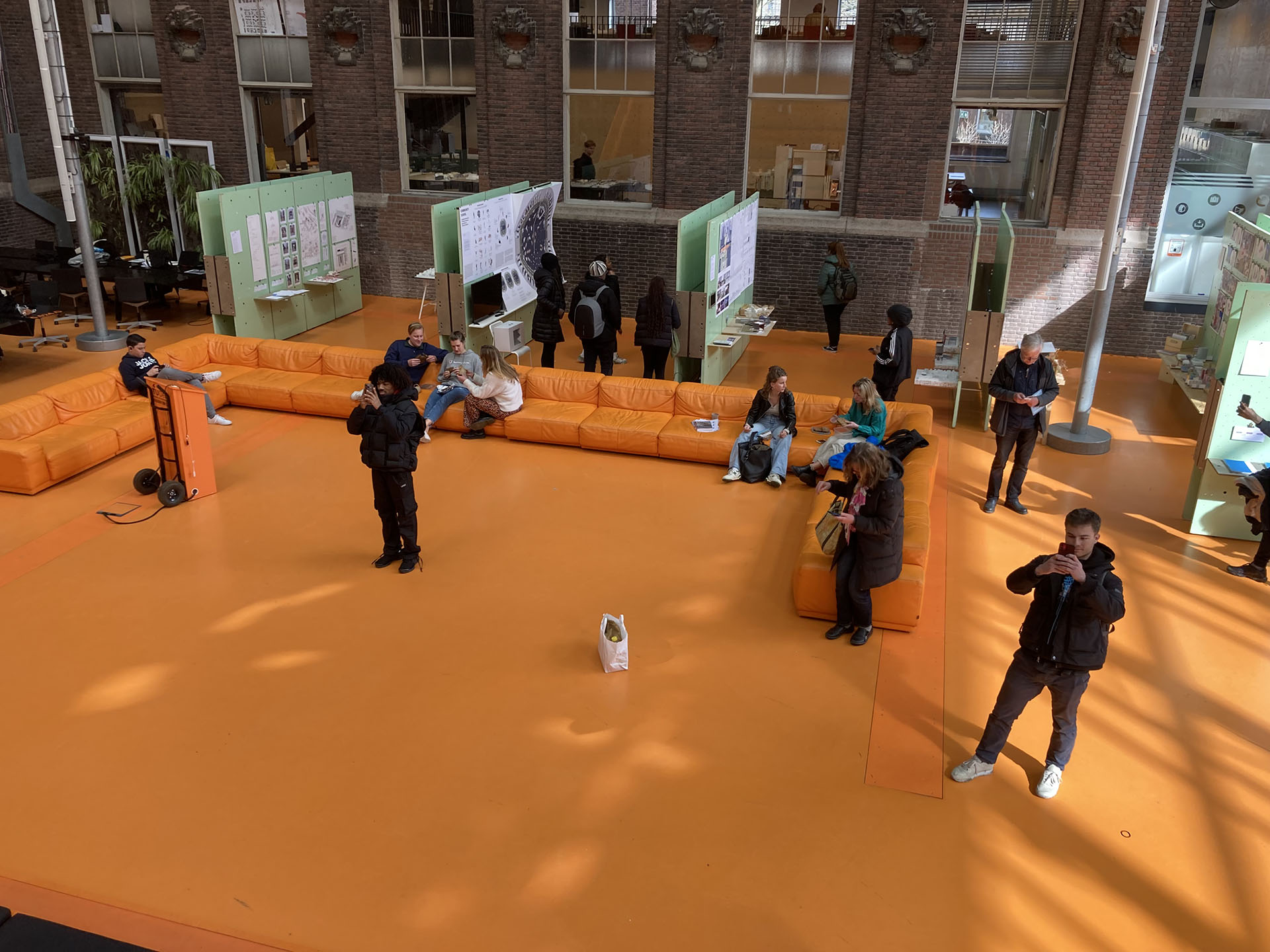Day 4 – Delft-Rotterdam – Back Down Memory Lane 3-13-2023
We arrived at the Delft University of Technology (TU Delft) campus early this morning. To me, that was a walk down memory lane. I studied at the campus many years ago and so many memories jumped on me on this hazy morning… I could still see a young architecture student rushing to class, hoping to come up with a solid concept for the design studio, aspiring for an internship with OMA, and desiring to become an architect… one day. And that day is today: I am walking Campus Avenue with 12 ambitious students who are, just like me so many years ago, dreaming of becoming good architects one day. Today they are here with me waiting for me to say something that makes sense and can inspire them to continue this arduous tortuous goal. They decided to spend their Spring Break here in the Netherlands, they trusted I could lead them to discover new realities and to build important experiences. I hope not to let them down.
At the School of Architecture (Bouwkunde), Urbanism, and Construction Management we met with Dr. Roberto Rocco who, together with his colleagues, Marcin Dabrowski and Juliana Goncalves gave us an extraordinary introduction to the school and the country! Dr. Rocco spoke about the Netherlands in terms of climate resilience, sustainability, location (low land), and the way it was generated. The country is not natural: the landscape has been built by people which explains the great sense of attachment and belonging that promotes a concept of land being that is very cultural. The Dutch are attached to their farms, animals, tulips, etc.… In general, the Netherlands is a collective-minded society, a rather equal society that has, however, become less so in the last 20 years. Recently, the political whirlwind of right conservationism is reaching this country too. When dealing with issues such as displacement, people tend to be less supportive of each other and immigration is becoming a big issue. Although social housing is still good and decent, there is a strong tendency to address the needs of the upper-middle class and push the rest of society toward peripheral areas.
Still, the Netherlands is characterized by a more democratic planning strategy: people are consulted before anything gets built. The overall vision is conceived with the residents and the future is consolidated through dialogue and drawings rather than policies and politics. Dr. Rocco emphasized the importance of the Polder model, Collective action, Consensus seeking, and trust in Institutions as markers of Dutch society.
Finally, he reiterated the economic importance of this small country. Rotterdam is, to present, one of the most important Ports in the world. Even if small, the country is one of the largest food exporters due to its use of greenhouses, hydroponics, and vertical agriculture. The water infrastructure is a means for wealth but also for destruction The country is positioned, for the most, below sea level and the Dutch invested enormously in its physical protection.
Marcin Dabrowski led us through the Dutch Design Approach! The Netherlands is a rather small country; hence designers have established interesting spatial planning approaches toward design such as a focus on sustainability and energy efficiency; use of local materials; coordination of space and activities; designing on a large scale to meet long-term vision desires; and participatory design.
He fast-forwarded through a planning timeline. In the 1990s the Vinex locations stimulated a transit-oriented mentality and maintained nature clusters around the city. In 2000, the Netherlands experienced a period of NO planning. The country adopted a free market orientation, less centralized.
Today, the Dutch planning vision relies on factors such as Participatory and Democratic design; Adaptation to climate change; Aging populations; Housing shortages; Renewable energy; Greener cities; Adopting de-globalization
Finally, Juliana Goncalves gave us a quick peek at Participatory Design and how her department is implementing it in its studies. Fundamentally, there is little to no trust in academia and communities feel exploited by intellectuals whose sole purpose for connecting with them is to gain insight for publishing a paper in a journal. Rarely are there outcomes resulting from academic studies and this needs to change!
Our first Rotterdam base visit was hosted by Duzan Doepel (Founding Partner) from DOEPELSTRIJKERS. Their work ethics and philosophy are outstanding. Their keen eye for space layout and technology is evident in all they do. Their work focuses on sustainability in its broad meaning and circular economy is applied to all their designs. Duzan showed us projects in which technology influences the perception of product consumption and how it influences the consumer’s experience of the space. Yet, the star project of the presentation was the Dutch Windwheel. The narrative of how they conceived the project was entertaining and the outcome, which is still ongoing, is fascinating! Once upon a time, there were two friends who, while drinking at a bar and sketching on a napkin, came up with the astonishing idea of combining tourism with saving the world! The mega wheel is at the same time an icon and a sustainable architecture that jump-starts the positive impacts of energy generation, transportation, and conservation.
Before our day was over, we cycled over the UNStudio Erasmus bridge and reached Powerhouse Company. Albert Takashi Richters (Partner Architect) walked us through the floating office concept while explaining Rotterdam’s position within a wider European sustainability strategy that focuses on Dutch climate and social resiliency. While crossing the bridge, I bet we were all wishing we had booked one of those AirBnB floating rooms on the Rijnhaven.
Day 3 – Amsterdam Walking Tour
Day 6 – Depot Boijmans Van Beuningen
Contact Information
Office of Public Relations & Strategic Communications
1700 East Cold Spring Lane
McMechen Hall Rm. 635
Baltimore, Maryland 21251
Contact Information
Office of Public Relations & Strategic Communications
1700 East Cold Spring Lane
McMechen Hall Rm. 635
Baltimore, Maryland 21251


